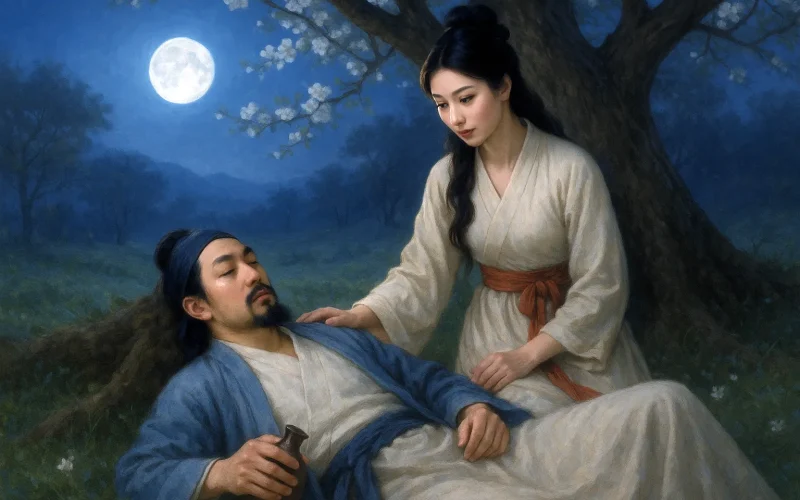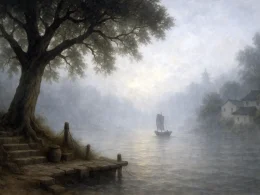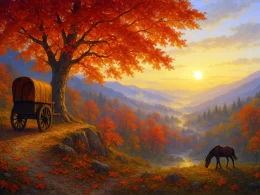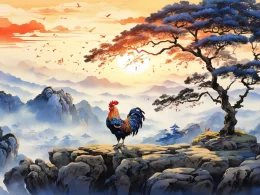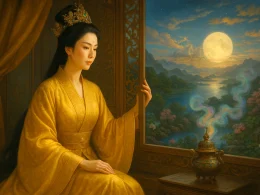For years by rivers and lakes I've wandered free,
Drunk deep in Master Huang's old tavern's glee.
Waking, I found the moon had climbed on high,
My robe with flowers' shade—asked help to get by.
Original Poem
「和袭美春夕酒醒」
陆龟蒙
几年无事傍江湖,醉倒黄公旧酒垆。
觉后不知明月上,满身花影倩人扶。
Interpretation
The exact date of this poem's composition is uncertain, but it is generally believed to have been written during the period of frequent poetic exchanges between Lu Guimeng and Pi Rixiu. The two shared a deep friendship and were renowned "rivers-and-lakes poets" of the late Tang, often drinking together and expressing their feelings through poetry. Pi Rixiu first wrote "Waking from Drink on a Spring Night," and Lu Guimeng responded with this poem, showcasing their mutual literary admiration and encouragement.
At the time, the Tang court was corrupt and warfare frequent; many scholars harbored aspirations to serve the country but found no outlet. Both Lu and Pi sought solace in drinking, poetry, and travel to ease their frustrations. Though this poem depicts the idle pleasure of drunkenness, it also implies complex emotions of unrecognized talent and retreat into nature.
First Couplet: "几年无事傍江湖,醉倒黄公旧酒垆。"
Jǐ nián wú shì bàng jiānghú, zuì dǎo Huáng Gōng jiù jiǔ lú.
For years, idling along rivers and lakes, with nothing done;
Drunk, I collapse by Huang Gong’s old wine shop.
The opening line reveals the poet’s wandering life and idle state; "idling along rivers and lakes" (无事傍江湖 wú shì bàng jiānghú) carries self-mockery, hinting at retreat and unconventionality after career disappointments. "Huang Gong’s wine shop" (黄公酒垆 Huáng Gōng jiǔ lú) alludes to A New Account of the Tales of the World, referring to an old tavern and implying the poet’s deliberate embrace of a free-spirited lifestyle, emulating the drunken escapism of Ruan Ji and Ji Kang.
Second Couplet: "觉后不知明月上,满身花影倩人扶。"
Jué hòu bù zhī míngyuè shàng, mǎn shēn huā yǐng qiàn rén fú.
After waking, I don’t know the moon has risen;
Full of floral shadows on me, I ask someone to help me stand.
The transition from drunkenness to wakefulness is vividly captured. "Don’t know" (不知 bù zhī) suggests lingering intoxication and a leisurely, unrestrained manner; "full of floral shadows" (满身花影 mǎn shēn huā yǐng) is the poem’s most inspired phrase—moonlit flower shadows draping the drunkard’s robe, composing a poetic picture of a spring night. "Ask someone to help" (倩人扶 qiàn rén fú) portrays both drunkenness and a touch of endearing clumsiness.
Holistic Appreciation
On the surface, this poem describes the joy of drunkenness on a spring night, but it actually conveys the poet’s reflections on life’s circumstances. Like Pi Rixiu, Lu Guimeng adopted an persona of unrestrained freedom; their drunken expressions were not merely pastimes but responses to worldly discontent. The first two lines speak of wandering and drinking, revealing the resentment and helplessness beneath a carefree exterior; the latter lines depict the moonlight and flower shadows after sobering up, creating a serene and beautiful atmosphere that reflects a lofty, relaxed elegance.
The poem blends boldness and tranquility, embodying both the unconventional spirit of Wei-Jin figures and the fresh, graceful style of Jiangnan landscape poetry, showcasing Lu Guimeng’s unique artistic character.
Artistic Merits
- Natural allusions with deep meaning: "Huang Gong’s wine shop" draws on典故 (diǎngù, allusions) without stiffness, reflecting the poet’s emulation of Wei-Jin风度 (fēngdù, demeanor) while containing self-mockery and self-consolation, enriching the poetic depth.
- Dynamic-static interplay and scene-emotion fusion: The first couplet leans toward narrative, describing collapse into drunkenness; the second shifts to scenery—moonlight, flower shadows, and the drunkard interplay with dynamic stillness and blended feeling.
- Fresh language, painterly quality: The poem’s diction is natural and unadorned, particularly "full of floral shadows," which is highly visual, merging spring night beauty with drunkenness into a distinctive意境 (yìjìng, artistic conception).
- Leisure tinged with hidden worry: Though depicting drunken idle pleasure, "idling along rivers and lakes" implies deep frustration over unrecognized talent and unfulfilled ambition. Beneath the surface of leisure lies the scholar’s underlying indignation.
Insights
This work is more than a literati’s post-drunk self-amusement; it is a portrait of life. It reminds us that drinking and poetry may briefly dispel sorrow, but what flows from the poet’s brush remains deeply hidden disappointment and helplessness. Just as the beauty of moonlit flower shadows can adorn life, it cannot obscure history’s weight or life’s anguish. Through this poem, Lu Guimeng tells us: true leisure is not the absence of worry, but a forced旷达 (kuàngdá, broad-mindedness) amid turmoil—a poetic refuge found within loss.
About the poet
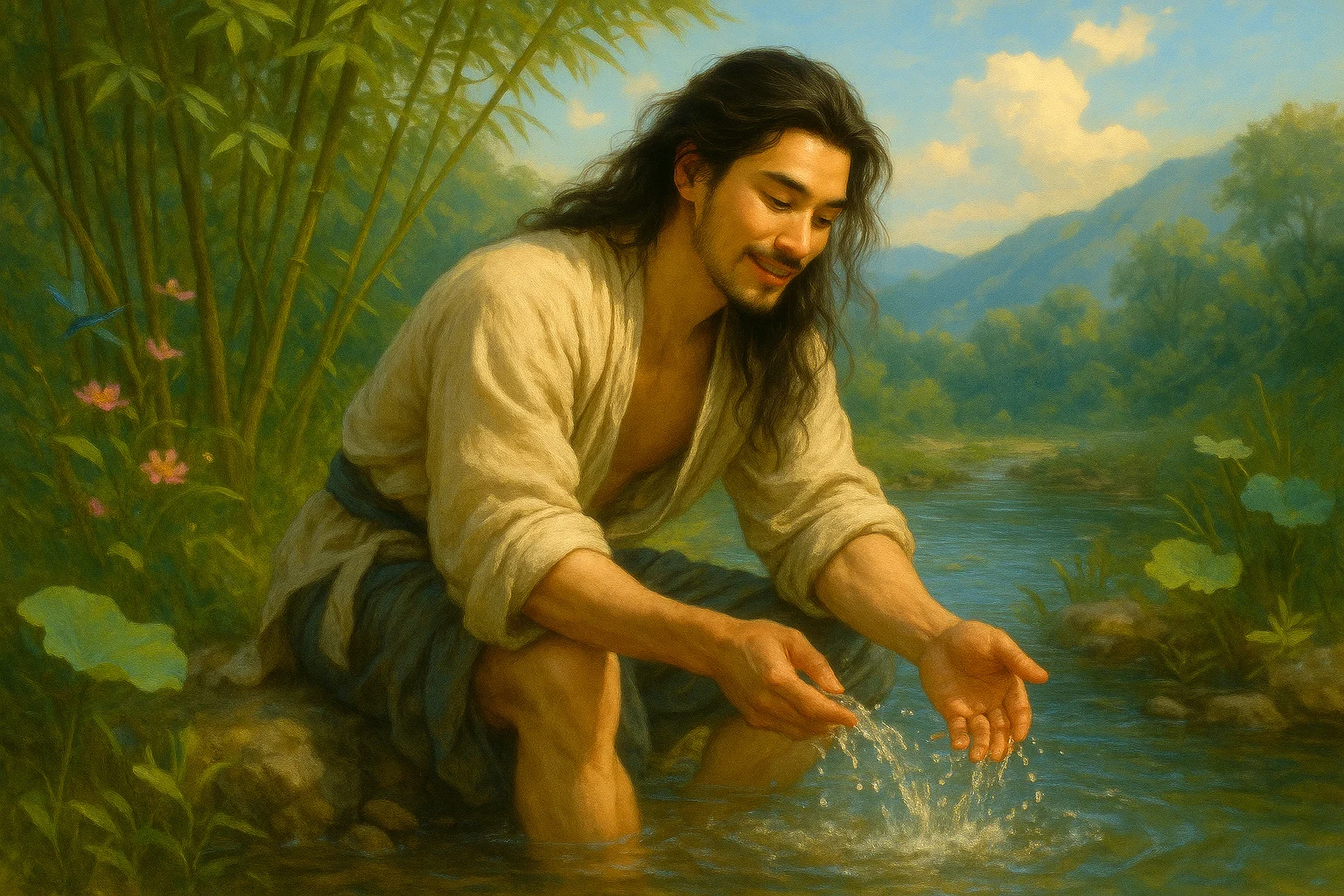
Lu Guimeng (陆龟蒙 ?– c. 881 CE), a native of Suzhou, Jiangsu, was a Late Tang dynasty writer and agronomist. After failing the imperial examinations, he retreated to a reclusive life in Puli, Songjiang. He formed a famous literary partnership with the poet Pi Rixiu, and the pair are often referred to collectively as "Pi-Lu." His poetry is known for its social satire and a style that is incisive yet subtly restrained. His inclusion in the Biographies of Talents of the Tangunderscores his significance. The modern writer Lu Xun famously praised his essays, noting that they provided "a sharp radiance piercing through a world of muddle". Lu Guimeng is regarded as a uniquely distinctive voice in the literary scene of the late Tang.






